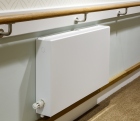Care home enjoys the safety benefits of Jaga LST radiators

Safe heating for a care home in Peterborough that was also quick and simple to install is provided by Guardian LST radiators from Jaga Heating Products. Located in the middle of the city, the £2.7 million development by Peterborough Care is a purpose-built home. Facilities at The Maltings include a cinema room, cafe, gymnasium and computing suite.
The single-panel Guardian radiators have Jaga’s Low-H2O energy-saving heat exchangers. 101 units were installed.
Stephen Arrowsmith, commercial director with installer Heatcare explains that one of the most beneficial features of these radiators is their pre-assembly and single-piece casing. ‘The Guardian was incredibly simple for us to fit. One of our staff managed to fit 46 brackets and elements in one day. The casings were even quicker, with all 101 fitted in a single work day, meaning a large saving on time and installation costs.’
As well as their low surface temperature, safety features of these radiators include a profile design to avoid sharp edges and complete casings to cover exposed pipework.
Jaga’s service included staged delivery, The heat exchangers and brackets were delivered to site as Heatcare required them. The casings were delivered last, avoiding them being damaged on site.








